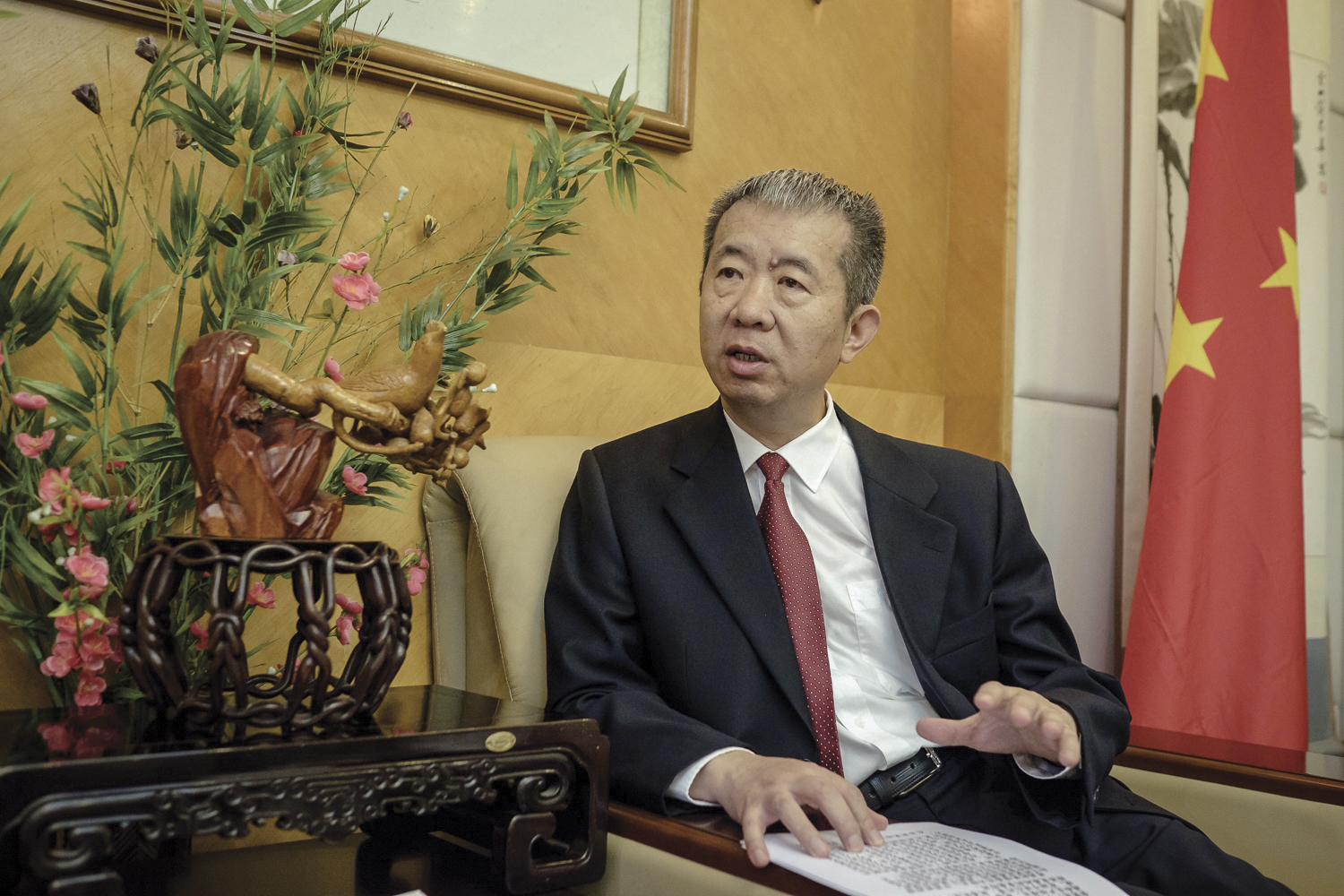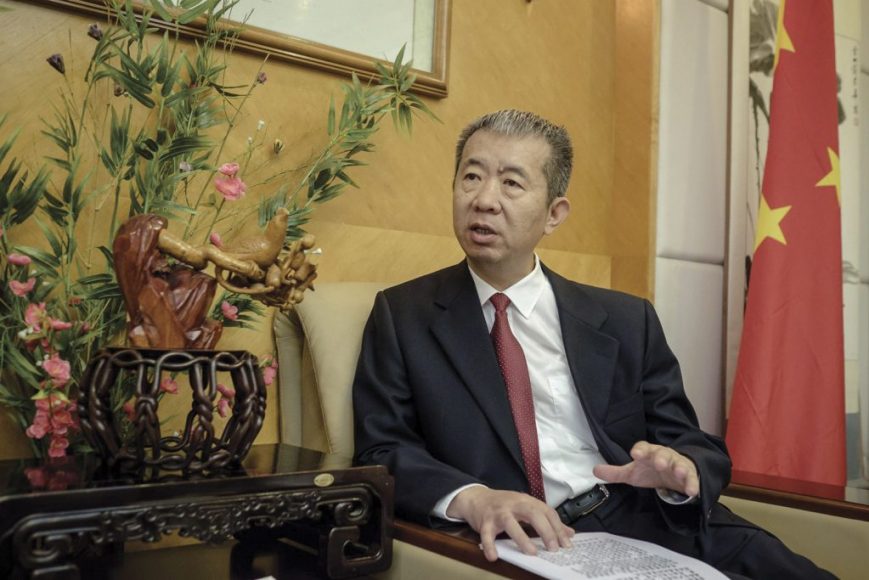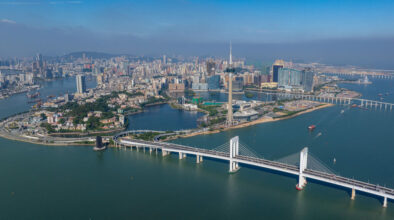PHOTOS Alexandre Marques
Tradition, mutual political trust and complementary economics serve as a foundation of Chinese and Mozambican co-operation
China will continue to support economic and financial sustainability [in Mozambique].
Su Jian
China will continue to support the economic development of Mozambique and considers the energy sector to be one of the potential areas for future investment, the ambassador of the People’s Republic of China in Mozambique, Su Jian, indicated during an interview with Macao Magazine in Maputo.
The ambassador noted the importance of Macao as a platform in relations between the Portuguese‑speaking countries and China, citing its potential role in personnel training and education.
He is no stranger to the region: Ambassador Su spent two years as a member of the Sino‑Portuguese Joint Liaison Group, preparing for Macao’s transfer to China in 1999, and for several years, he served in the Hong Kong and Macao Affairs Office of the Chinese Foreign Ministry.
The 60‑year‑old diplomat began his long career in Portugal in 1983. A fluent Portuguese speaker, he went on to serve in Guinea‑Bissau, Angola, Timor‑Leste, Cabo Verde and, since 2015, Mozambique.
Ambassador Su reiterated that Mozambique is one of China’s main partners in Africa and described some of the efforts underway to support the country’s growth.
What characterises relations between China and Mozambique today?
The friendly and cooperative relationship between China and Mozambique can serve as a reference for other African countries. Indeed, President Xi Jinping has said that Mozambique is a strategic partner of China forever. Our relations are solidly grounded and based on tradition, mutual political trust, and complementary economies. In 2016, the President of the Republic of Mozambique visited China, enabling the two sides to establish a comprehensive strategic partnership. Soon afterwards, we designated Mozambique a priority country for China to implement co‑operation with a view to augmenting production capacity.
The special relationship between Mozambique and China can be seen in the selection of Mozambique as the site for its first agricultural technology centre in Africa and the continent’s biggest bilateral cultural centre. China is now Mozambique’s top trading partner, one of its main financers and the builder of many major infrastructure projects in the country. And it has become the leading foreign investor.
Mozambique, in turn, is an African country that has closely accompanied the Belt and Road Initiative. It is also a part of that Initiative and may benefit with major infrastructure projects. Last year, it was one of the few African countries invited to take part in the international conference on co‑operation in the scope of Belt and Road, and has accordingly established a research centre focusing on the Initiative, which will have an academic role while also promoting projects and interchanges between the two countries.
When Chinese Foreign Minister Wang Yi visited Mozambique in 2016, he said that the country is a natural extension of the Maritime Silk Road of the 21st century because it has nearly 2,500 km of coastline and many ports, offering numerous advantages. It is also a terminal, a springboard linking the African coast to landlocked countries in the interior, and can serve as a strategic transport corridor between the sea and the hinterland.
The Mozambican government has begun its five‑year development plan and is promoting the respective industrialisation programme, with a particular focus on infrastructure projects. China has much to offer in this area, because it is also undergoing far‑reaching transformation and many sectors would like to transfer some of their capacity outside the country. If we are able to join China’s technological capability, talent, experience, and financing capacity to the large Mozambican market then we can mutually benefit each country’s interconnected development. We are facing new and historic opportunities.
Mozambique is now experiencing an economic slowdown after a period marked by major growth. During this phase, how can China be useful for its economy, for financing its production activity?
We are aware that, after 2015, the international economic situation and many natural disasters affected Mozambique’s international development, though we understand that those problems are transient. The Mozambican government has implemented certain measures, and from the second quarter of last year on, we’ve been able to see some positive signs of economic recovery. Mozambique now faces more opportunities than challenges.
Regarding the problems, debt immediately comes to mind. We understand that in the initial industrialisation period, several African countries used some foreign loans to promote certain production or infrastructure projects. From our standpoint, that’s understandable, given China’s experience during our initial period of reform and opening to the world.
In recent years, China has granted a number of concessional or interest‑free loans to back projects in Mozambique. Most have been for production or infrastructure projects that have improved investment conditions in Mozambique along with the population’s standard of living, both very important for launching the Mozambican economy. Bearing in mind the debt pressure on the Mozambican government, in the last three years, the Chinese government has increased its free help to finance projects in the country and also forgiven several interest‑free loan payments, all contracted by Mozambique until the end of last year.
We have also urged Chinese companies to change their mindset and way of cooperating in Mozambique, telling entrepreneurs to make more direct investments instead of seeking loans. We encourage Chinese entrepreneurs and bankers to try different forms of financing, so that co‑operation between the two countries can be sustainable. We do not want to exacerbate the Mozambican government’s financial burden. At the same time, we are working with it to find sustainable development solutions.
The Chinese government has increased its free help to finance projects in the country and also forgiven several interest‑free loan payments.
Su Jian
We are also promoting industrialisation, trying to transform Mozambique’s assets in the area of human and natural resources, enhancing sustainable development capacity that can benefit its population. When the two heads of state met in Beijing, they reached consensus that the two countries’ priorities should focus on the exploitation of natural and energy resources, while at the same time promoting the manufacturing industry. Our priority has thus been to move forward with the initiative on production capacity co‑operation.
That initiative is based on several essential pillars: preparing infrastructure, developing human resources – specifically within industry – and securing financing. That co‑operation augments Mozambique’s national production while boosting the country’s ability to face difficult situations and financial and economic risks like those it now experiences. Mozambique is passing through a relatively difficult period and we’re providing some strong support.
What are the current priority bilateral co‑operation areas?
One of our priority areas is transport and communication. China has financed and built a repair centre to resolve the problem of maintaining the many buses China delivered in the last several decades. We offered 80 buses for public transportation last year, and should add another 100 this year.
Other projects include installing satellite TV systems in 500 African villages and hamlets, and enlarging National Road 6, a strategic route between Zimbabwe and the port of Beira, which will be finished in a few months. We are also building new railways, roads, and bridges here.
In the area of public health, China has just delivered a paediatrics unit to Beira Central Hospital and the residential building for Mozambican and Chinese doctors working at the hospital in Maputo is nearly finished. Last year, a large Chinese Navy ship visited Mozambique and during its weeklong stay Chinese doctors saw 10,000 patients, breaking the record for the last five years. Since last year, we have been sending teams of military doctors to work in the Maputo Military Hospital.
In the area of human resources, we have finished a professional and technical training project in Nampula and will soon start work on a similar school in Sofala. We also have Mozambican scholarship students studying in Chinese universities. Our government annually offers more than 300 professional training places for Mozambican civil servants and technical personnel.
Regarding food security, we donated more than 10,000 tons of rice in 2016, and have continued to donate tens of thousands of tons each year to help the country cope with floods and drought. At the same time we are doing something else: Mozambique’s leaders have said they don’t just want to ask China for things; they want to produce more. So we’re sending Chinese experts to help, and transferring technologies to farmers so they can boost local agriculture production. A technical training and co‑operation centre for agriculture has been established in Boane, which can also be used for technical capacity‑building. We are conducting the first African trial of trilateral China‑America‑Mozambique co‑operation in agriculture, to help farmers escape poverty by means of cereal production, processing, and agribusiness.
In the area of media and culture, we have offered direct TV transmission vehicles to TVM [Televisão de Moçambique], besides providing equipment for digital TV in the provinces and respective capitals. Indeed, China is helping Mozambique implement a project for the switch to digital TV and radio. TVM’s new production centre is under construction next to the original building. We believe these projects will help Mozambique put in place the conditions for international cultural interchanges, endowing its population with more cultural space and access to news and trends affecting the international situation.

Regarding the energy sector, which Mozambique considers very important for its next several years of growth, how will China get involved?
China can be a pilot country or pioneer in energy co‑operation with Mozambique. The Chinese government supports bilateral co‑operation in the energy sector. For example, in May 2016, CNPC [China National Petroleum Corporation] and Mozambique’s state‑owned ENH [Empresa Nacional de Hidrocarbonetos] signed a co‑operation agreement in Beijing.
A few years ago, CNPC paid more than US$4 billion to acquire 20 per cent of area 4 in the Rovuma Basin from Italy’s ENI. Up to now, CNPC has invested more than US$5 billion in that area. According to company forecasts, it will continue to invest in moving that huge project forward, and will also participate in its operation. And not only that: several Chinese banks are also financing the project, with their contribution reaching 37 per cent in the first phase.
Last year, the Mozambican minister of Mineral Resources and Energy visited China, signing various agreements and protocols. Beyond that investment, some Chinese companies are now showing interest in buying natural gas products in Mozambique. We believe that is a reason to encourage and speed up the process. Our participation in that area is very strong, because China is now the world’s top financing market for the energy sector. China’s natural gas requirements have also been rising and we believe the supply markets must be diversified.
In infrastructure, Chinese companies have also been playing an important role. In the future, and in the context of Belt and Road, what other infrastructure may eventually be born here?
China is now the biggest financer and builder of infrastructure in Mozambique, among them the bridge between Catembe and Maputo, the Maputo Ring Road, and the Beira fishing port. The memorandum of understanding signed last year lists 13 priority areas, primarily infrastructure, industrial parks, agriculture, and natural and energy resource exploitation. The two sides are now promoting various special economic zones and industrial parks. Some involve the manufacturing industry, others public works or the processing of agro products. Many Chinese companies are involved.
Mozambique’s aim is to improve its industrialisation step by step. We know that by 2022 Mozambique will have natural gas revenues, and understand that we have to help the country strengthen its parallel industrial system to ensure that the economy doesn’t depend solely on natural resources. That’s what we’re doing now.
Projects we’re involved in include construction of the airport in Xai‑Xai, Gaza, the only provincial capital without one. China’s biggest rice plantation project in Africa is there, and several Chinese companies are now promoting agribusiness industrial parks in the province. The major Chibuto heavy sands project is also nearby. The manner of financing will be diverse. We prefer different public‑private partnerships instead of requesting sovereign guarantees from the Mozambican government. We don’t want its financial burden to increase; the aim is to achieve sustainability.
Regarding the specific role Macao can play and is playing in this process, what do you expect?
Macao can be considered a bridge, a platform linking the Chinese continent and Portuguese language countries. The headquarters of the Forum for Economic and Trade Co‑operation between China and Portuguese‑speaking Countries [Forum Macao] is notably located there and the city offers many advantages, because the legal system is similar to the systems in those countries. Macao has many financial resources to back opportunities and is in constant contact with the Lusophone world, maintaining very close ties with figures and individuals in those countries. Macao’s culture likewise has certain similarities, and many of its people are bilingual.
There’s a lot to do. Regarding Africa, specifically the Portuguese‑speaking African countries, Macao can help in the area of training. Our central government places great emphasis on the educational mission. Numerous bilateral and multilateral courses are offered every year; every week, one or another is under way. If Macao wants to take part, to put its advantage to use, then I believe it can play a vital role through bilingualism and the promotion of university interchanges.
Mozambican rectors come to the embassy every month seeking partnerships with Chinese universities and I believe Macao can do something there. China offers young Mozambicans a hundred scholarships for undergraduate, master’s, and doctoral degrees annually. But the demand is very strong, there’s a lot of competition, and we have limited resources. Macao also offers two or three Macao Foundation scholarships. If that number were increased a bit it would be a great help. Mozambique needs many trained personnel in the near future, to help achieve an autonomous economy and meet the challenges of natural gas exploitation.
Macao also has experience in library interchanges with Portuguese‑speaking countries and in organising cultural festivals and TV programme exchanges. When I was ambassador in Cabo Verde, I always watched the Portuguese‑subtitled programmes that came from Macao. It also has considerable experience hosting international events and conferences. The Maputo AFECC Hotel Gloria, a joint China‑Mozambique project, has an international conference centre for 2,000 people. More and more events are taking place in Maputo, but to attract investors, they also need to organise and coordinate international conferences, fairs, and exhibitions.
The Mozambican government has set five priorities – one is tourism. Not many Chinese tourists have come, so far, but co‑operation with Macao could help attract them. Also, if Chinese investors are interested, more hotels can be built here. Many Chinese companies are already working here, but they don’t know the laws, culture or language, or how to contact the banks. Macao offers an advantage there: it can supply legal advice and also facilitate financial consultation and translation services. Some entrepreneurs from Macao, some banks, could be represented here.
According to CNPC’s estimates, in the next few decades, the exploitation of just areas 1 and 4 will earn the Mozambican government at least US$200 billion in taxes at the current price. If the price goes up, even more. That means the Mozambican economy will soon awaken and go through a period of rapid development, with lots of opportunities. Macao cannot miss those opportunities.



